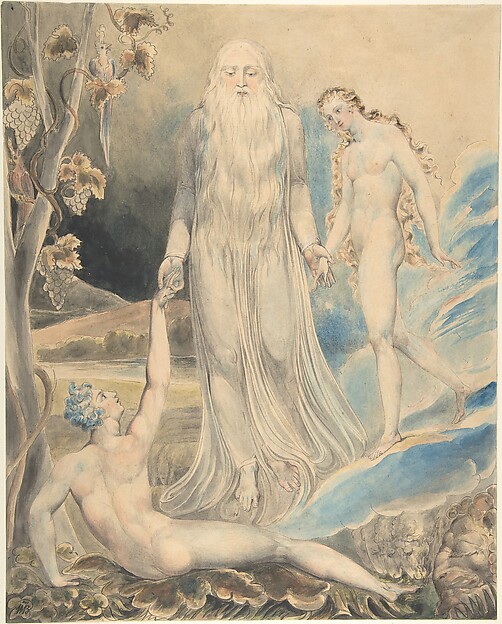 |
| Metropolitan Museum Angel of the Divine Presence Bringing Eve to Adam |
Analytically we can say that Golgoonoza is:
>the city of art & Manufacture,
>spiritual Four-fold London eternal,
>the place where souls of the dead are given bodies,
>the internal organs of the human body,
>the printing house in Lambeth where William and Catherine produced books,
>the location of the furnaces of Los and the looms of Enitharmon,
>our own spiritual activities which contribute to the building the Kingdom of God.
Jerusalem, Plate 77, (E 231)
"I know of no other
Christianity and of no other Gospel than the liberty both of body
& mind to exercise the Divine Arts of Imagination.
Imagination the real & eternal World of which this Vegetable
Universe is but a faint shadow & in which we shall live in our
Eternal or Imaginative Bodies, when these Vegetable Mortal Bodies
are no more."
Milton, Plate 24 [26], (E 120)
"But Golgonooza is namd Art & Manufacture by mortal men.
In Bowlahoola Los's Anvils stand & his Furnaces rage;
Thundering the Hammers beat & the Bellows blow loud
Living self moving mourning lamenting & howling incessantly
Bowlahoola thro all its porches feels tho' too fast founded
Its pillars & porticoes to tremble at the force
Of mortal or immortal arm: and softly lilling flutes
Accordant with the horrid labours make sweet melody
The Bellows are the Animal Lungs: the hammers the Animal Heart
The Furnaces the Stomach for digestion. terrible their fury"
Milton, Plate 26 [28], (E 123)
"And every Generated Body in its inward form,
Is a garden of delight & a building of magnificence,
Built by the Sons of Los in Bowlahoola & Allamanda
And the herbs & flowers & furniture & beds & chambers
Continually woven in the Looms of Enitharmons Daughters
In bright Cathedrons golden Dome with care & love & tears
For the various Classes of Men are all markd out determinate"
Jerusalem, Plate 10, (E 153)
"it is the Reasoning Power
An Abstract objecting power, that Negatives every thing
This is the Spectre of Man: the Holy Reasoning Power
And in its Holiness is closed the Abomination of Desolation
Therefore Los stands in London building Golgonooza
Compelling his Spectre to labours mighty; trembling in fear
The Spectre weeps, but Los unmovd by tears or threats remains
I must Create a System, or be enslav'd by another Mans
I will not Reason & Compare: my business is to Create
So Los, in fury & strength: in indignation & burning wrath
Shuddring the Spectre howls. his howlings terrify the night
He stamps around the Anvil, beating blows of stern despair
He curses Heaven & Earth, Day & Night & Sun & Moon
He curses Forest Spring & River, Desart & sandy Waste
Cities & Nations, Families & Peoples, Tongues & Laws
Driven to desperation by Los's terrors & threatning fears
Los cries, Obey my voice & never deviate from my will
And I will be merciful to thee"
Commentary from Northrop Frye in Fearful Symmetry:
Page 252
"Los is the builder of the eternal form of human civilization, and is therefore a smith, a worker in metal and fire, the two great instruments of civilized life.
Page 253
"If we combine the fact that Los is a blacksmith with the fact that Orc is his medium, we get the furnace as a symbol of the natural body. On the level of a conscious will to live the hammer is the heart-beat, the bellows the lungs and the furnace the whole metabolism of a warm-blooded animal. The same is true of the risen or spiritual body, but that body is part of Golgonooza, which is conceived a huge machine shop or foundry, a vast cubicle into which the whole physical world has to be thrown before the refined gold of the New Jerusalem can emerge from it. There are seven furnaces in Los's smithy, corresponding to the Seven Eyes, and they are associated with wheels in a way which we shall explain more fully later. In them are to be found Ezekiel's 'wheels within wheels,' imaginative energy as opposed to the interlocking compulsions of nature which we see represented in physical machinery. The allusions of the finger of God touching the seventh furnace refer of course to the coming of Jesus."
Earlier posts with the label Golgonooza.






